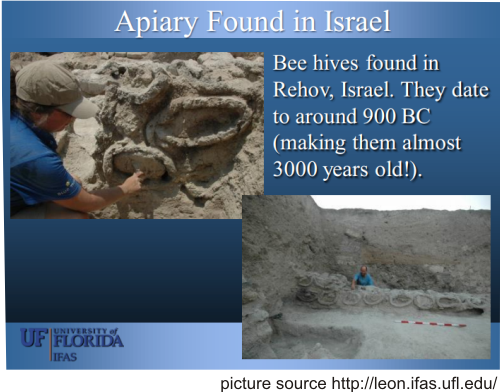It is said that the word honey is mentioned 61 times in the Bible. It was impossible for me to count, but there are plenty of people who did that. After researching the subject, here are the important occasions where honey appears. It represents:
Abundance:
We have all heard of the land where honey and milk flow. It’s a proverbial metaphor, expressing abundance, Hebrews were using when referring to Palestine. This reference is repeated twenty-one times in the Bible.
The LORD said, I have surely seen the affliction of my people which are in Egypt, and have heard their cry by reason of their taskmasters; for I know their sorrows; And I am come down to deliver them out of the hand of the Egyptians, and to bring them up out of that land unto a good land and a large, unto a land flowing with milk and honey; unto the place of the Canaanites, and…” (Exodus 3:6-8)
It appears in the songs of Moses: “he shall not see the rivers, the flowing streams of honey and butter.” (Job 20: 17.)
Today’s honeydew honey is supposed to be what they referred on those times as manna, the heaven-born manna, on which the Israelites subsisted in the desert for forty years.
Healthy food:
John the Baptist survived on honey. ” John’s clothes were made of camel’s hair, and he had a leather belt around his waist. His food was locusts and wild honey.” (Mark 1: 6, Matth. 3: 4).
The day Christ rose from the dead and appeared before His Disciples, He asked for food. They gave Him broiled fish and a honeycomb (Luke 24: 42). Christ ate the food to prove to the Apostles that He was truly resurrected and not merely a Spirit or a Thought.
In his work, De Vita Contemplativa, Philo describes a caste among the Hebrews called Essenes. They were living in the region of the Dead Sea, and were supposed to cultivate bees and produce honey.
In the “Antiquities of the Jews”, Josephus also mentions the Essenes of Judea. The Greek term Essenos (king bee) was the epithet of Zeus. The priestesses of Artemis were called Melissai (bees) and their high priests, Essenes.). Read more about honey in Ancient Greece.
Prophet Isaiah (eighth century B.C.) mentions honey and butter: “… for butter and honey shall everyone eat that is left in the midst of the land.” (Isa. 7: 21.)
The Jews put aside honey for future use is proven by the appeal of the men to Ishmael: “Slay us not, for we have stores hidden in the fields, of wheat and of barley and of oil and of honey.” (Jer. 41: 8.)
King David’s army, 3,000 years ago, was provided with honey, . . . “they brought beds and basins and earthen vessels and wheat and barley . . . beans and lentils . . . and honey and butter for David and for the people with him, to eat; for they said, the people are hungry and weary and thirsty in the wilderness.” (2 Sam. 17: 28, 29.) Honey seems to had been never missing food from their diet. Son of Sirach, recognized honey as “one of the principal things for use in man’s life.” (Eccl. 39: 26.)
One who is full loathes honey, but to one who is hungry everything bitter is sweet. Proverbs 27:7 ESV
An honored gift:
In about 1700 BC Jacob told his sons to take “….a little balsam, a little honey…” as a present when they set off to visit their brother Joseph (Genesis 43.11)
When Jeroboam’s queen visited the blind Prophet Ahijah at Shiloh (Kings 14: 3), she brought with her a cruse of honey in order to obtain a favorable report about her dying son. It was a gift, but it may have been just as well a medicine to cure the Prophet’s blindness.
Honey was allowed as a “not burnt” offering, or as a tribute of first fruit (Lev. 2: 12). One may assume that the Jews used honey as a leavening for baking purposes. But on the other hand, honey sacrifices were prohibited by the Jews as honey was liable to ferment. “Ye shall burn no leaven, nor any honey as an offering unto Jehovah” (Lev. 2: z I)

A medicine:
Probably the most famous saying is the one attributed to the wise King Solomon “Eat thou honey because it is good”.
“Pleasant words are as an honeycomb, sweet to the soul and health to the bones.” In Solomon’s Proverbs (16: 24)
A metaphor or a comparison of sweetness:
• David, who had been a shepherd boy, often utilized metaphorically the sweetness of honey:
“The judgment of the Lord is sweeter than honey and the drop-pings of the honeycomb.” (Ps. 19: I0.)
• “How sweet are thy words to my taste, yea, sweeter than honey in my mouth.” (Ps. 119 : 102.)
• “The lips of the bride are as sweet as honey. The lips of the concubine are like honey but later bitter as vermuth” (Prov. 5:3).
• There are two accounts in the Bible of men being ordered to eat a book and in each case
– “the book tasted as sweet as honey.” (Ezek. 3: 3 and Revel. I0: 9, i0.)
– in the Revelation: “And I took the little book out of the angel’s hand, and ate it up; and it was in my mouth sweet as honey.”

Related articles:
Honey in history. Prehistory, Ancient Egypt, Ancient China.
Honey in history: Ancient India
Honey in history: Ancient Greece
References:
gospel.com
honey-health.com/honey-in-the-bible/;
Picture credits:
“Bible” by Janaka Dharmasena via free digital photos;
“Opened bible” picture credit Ryk Neethling via clickr.com;
“Apiary found in Israel” picture credit leon.ifas.ufl.edu




